SIT740 Research: Ethical Considerations in AI Development
VerifiedAdded on 2023/06/11
|6
|1602
|251
Report
AI Summary
This report provides summaries and reflections on two articles concerning ethical considerations in Artificial Intelligence (AI) and its development. The first article, "Ethically Aligned Design," discusses general AI principles, embedded values, and methodologies for system design, including the concept of Artificial Super Intelligence (ASI), individual access controls, and the importance of personal data. It raises humanitarian, economic, and legal factors, emphasizing responsibility, transparency, and awareness. The second article, "Society-in-the-Loop," addresses governance and regulatory mechanisms for AI and Machine Learning, proposing a conceptual framework for algorithmic systems and advocating for a social contract between stakeholders and machines. It explores the concept of SITL, highlighting stakeholder exposure and compliance monitoring. The reflection emphasizes the need for AI legislation and policies, addressing concerns about decision-making processes and suggesting a phased implementation approach, while also considering the current implications of AI and the balance between ethical laws and technological advancement. The author concludes that both articles helped in understanding the future implications of AI and how to counter them with guidelines, with the hope that AI and humans can coexist ethically.
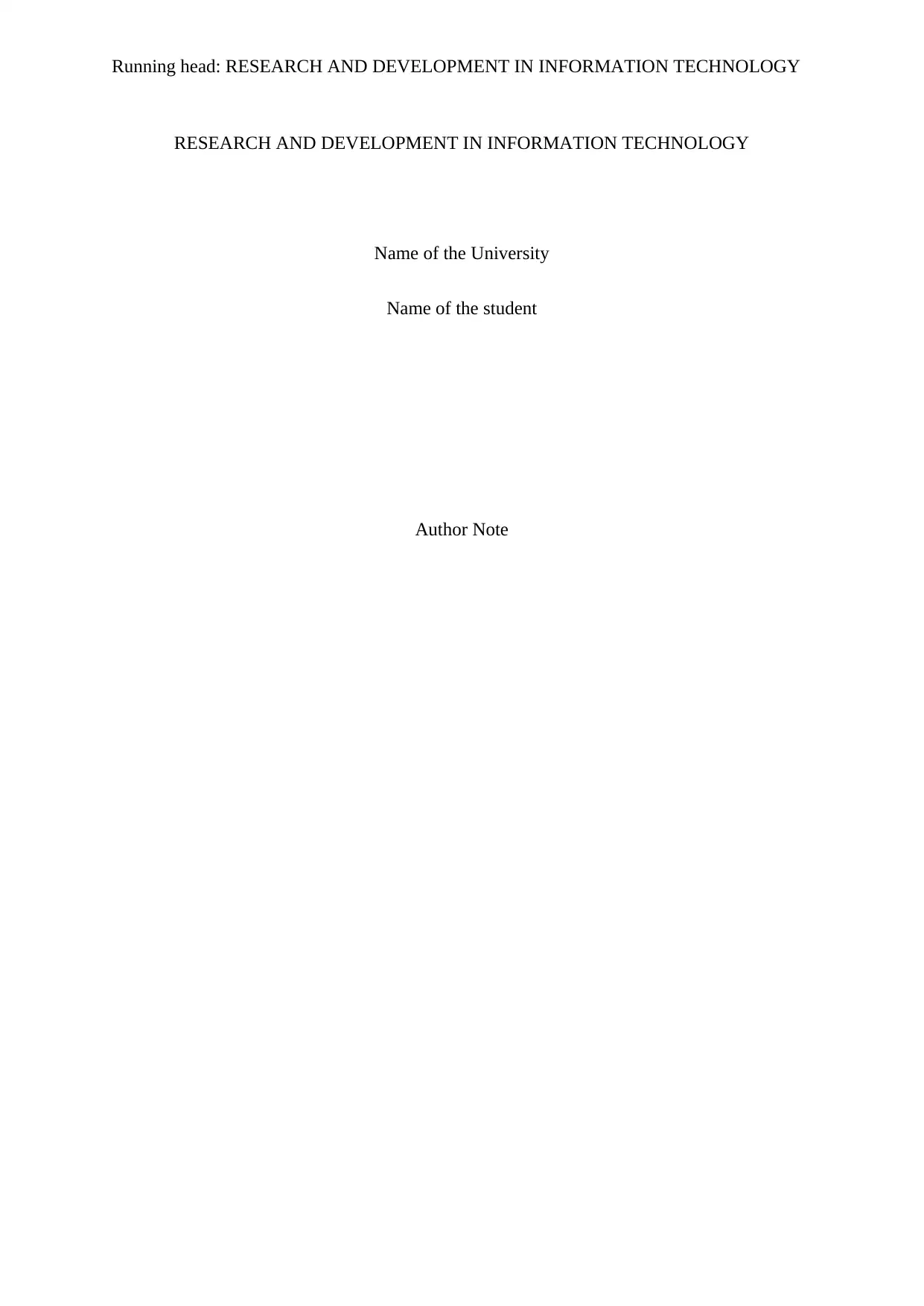
Running head: RESEARCH AND DEVELOPMENT IN INFORMATION TECHNOLOGY
RESEARCH AND DEVELOPMENT IN INFORMATION TECHNOLOGY
Name of the University
Name of the student
Author Note
RESEARCH AND DEVELOPMENT IN INFORMATION TECHNOLOGY
Name of the University
Name of the student
Author Note
Paraphrase This Document
Need a fresh take? Get an instant paraphrase of this document with our AI Paraphraser
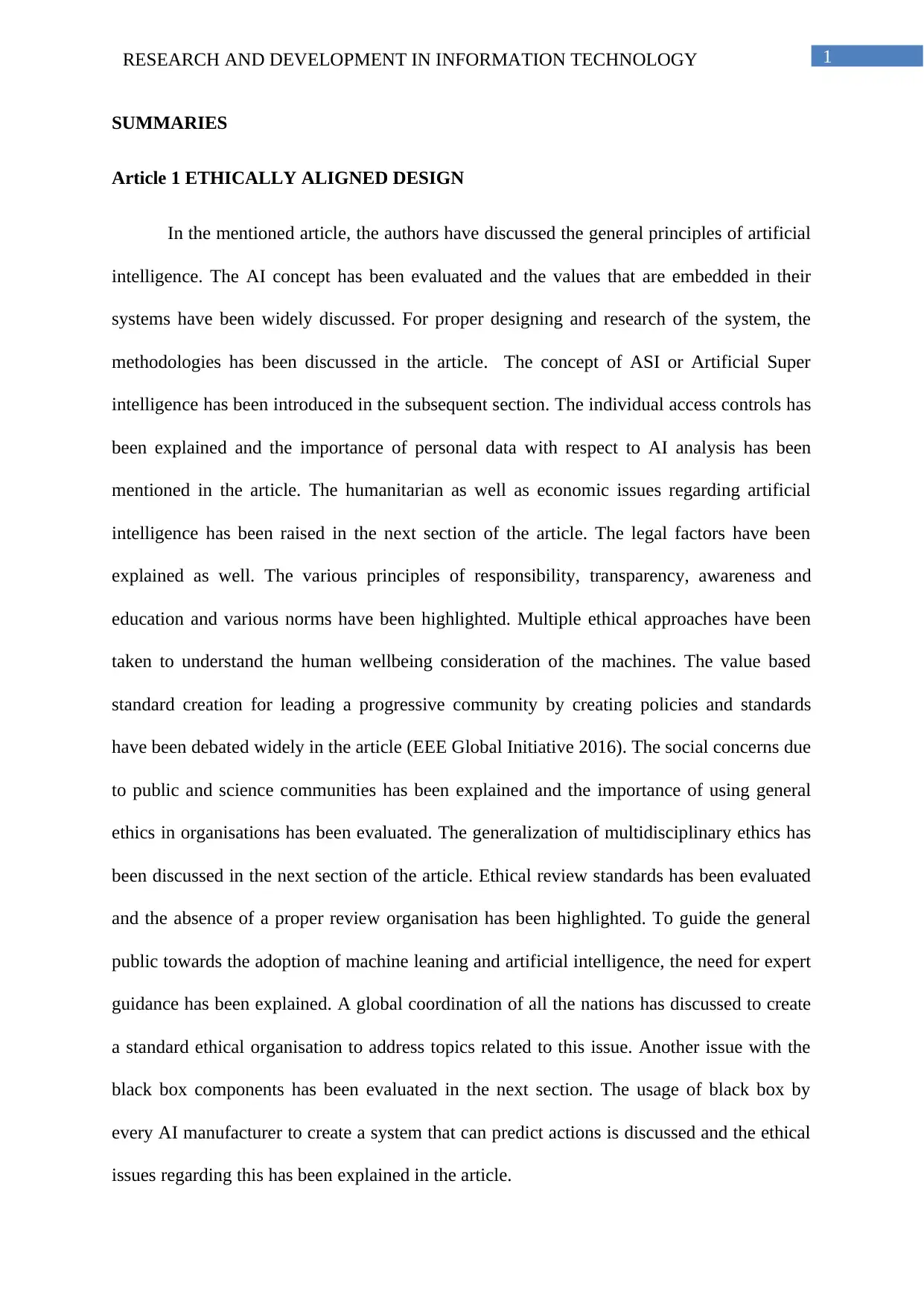
1RESEARCH AND DEVELOPMENT IN INFORMATION TECHNOLOGY
SUMMARIES
Article 1 ETHICALLY ALIGNED DESIGN
In the mentioned article, the authors have discussed the general principles of artificial
intelligence. The AI concept has been evaluated and the values that are embedded in their
systems have been widely discussed. For proper designing and research of the system, the
methodologies has been discussed in the article. The concept of ASI or Artificial Super
intelligence has been introduced in the subsequent section. The individual access controls has
been explained and the importance of personal data with respect to AI analysis has been
mentioned in the article. The humanitarian as well as economic issues regarding artificial
intelligence has been raised in the next section of the article. The legal factors have been
explained as well. The various principles of responsibility, transparency, awareness and
education and various norms have been highlighted. Multiple ethical approaches have been
taken to understand the human wellbeing consideration of the machines. The value based
standard creation for leading a progressive community by creating policies and standards
have been debated widely in the article (EEE Global Initiative 2016). The social concerns due
to public and science communities has been explained and the importance of using general
ethics in organisations has been evaluated. The generalization of multidisciplinary ethics has
been discussed in the next section of the article. Ethical review standards has been evaluated
and the absence of a proper review organisation has been highlighted. To guide the general
public towards the adoption of machine leaning and artificial intelligence, the need for expert
guidance has been explained. A global coordination of all the nations has discussed to create
a standard ethical organisation to address topics related to this issue. Another issue with the
black box components has been evaluated in the next section. The usage of black box by
every AI manufacturer to create a system that can predict actions is discussed and the ethical
issues regarding this has been explained in the article.
SUMMARIES
Article 1 ETHICALLY ALIGNED DESIGN
In the mentioned article, the authors have discussed the general principles of artificial
intelligence. The AI concept has been evaluated and the values that are embedded in their
systems have been widely discussed. For proper designing and research of the system, the
methodologies has been discussed in the article. The concept of ASI or Artificial Super
intelligence has been introduced in the subsequent section. The individual access controls has
been explained and the importance of personal data with respect to AI analysis has been
mentioned in the article. The humanitarian as well as economic issues regarding artificial
intelligence has been raised in the next section of the article. The legal factors have been
explained as well. The various principles of responsibility, transparency, awareness and
education and various norms have been highlighted. Multiple ethical approaches have been
taken to understand the human wellbeing consideration of the machines. The value based
standard creation for leading a progressive community by creating policies and standards
have been debated widely in the article (EEE Global Initiative 2016). The social concerns due
to public and science communities has been explained and the importance of using general
ethics in organisations has been evaluated. The generalization of multidisciplinary ethics has
been discussed in the next section of the article. Ethical review standards has been evaluated
and the absence of a proper review organisation has been highlighted. To guide the general
public towards the adoption of machine leaning and artificial intelligence, the need for expert
guidance has been explained. A global coordination of all the nations has discussed to create
a standard ethical organisation to address topics related to this issue. Another issue with the
black box components has been evaluated in the next section. The usage of black box by
every AI manufacturer to create a system that can predict actions is discussed and the ethical
issues regarding this has been explained in the article.
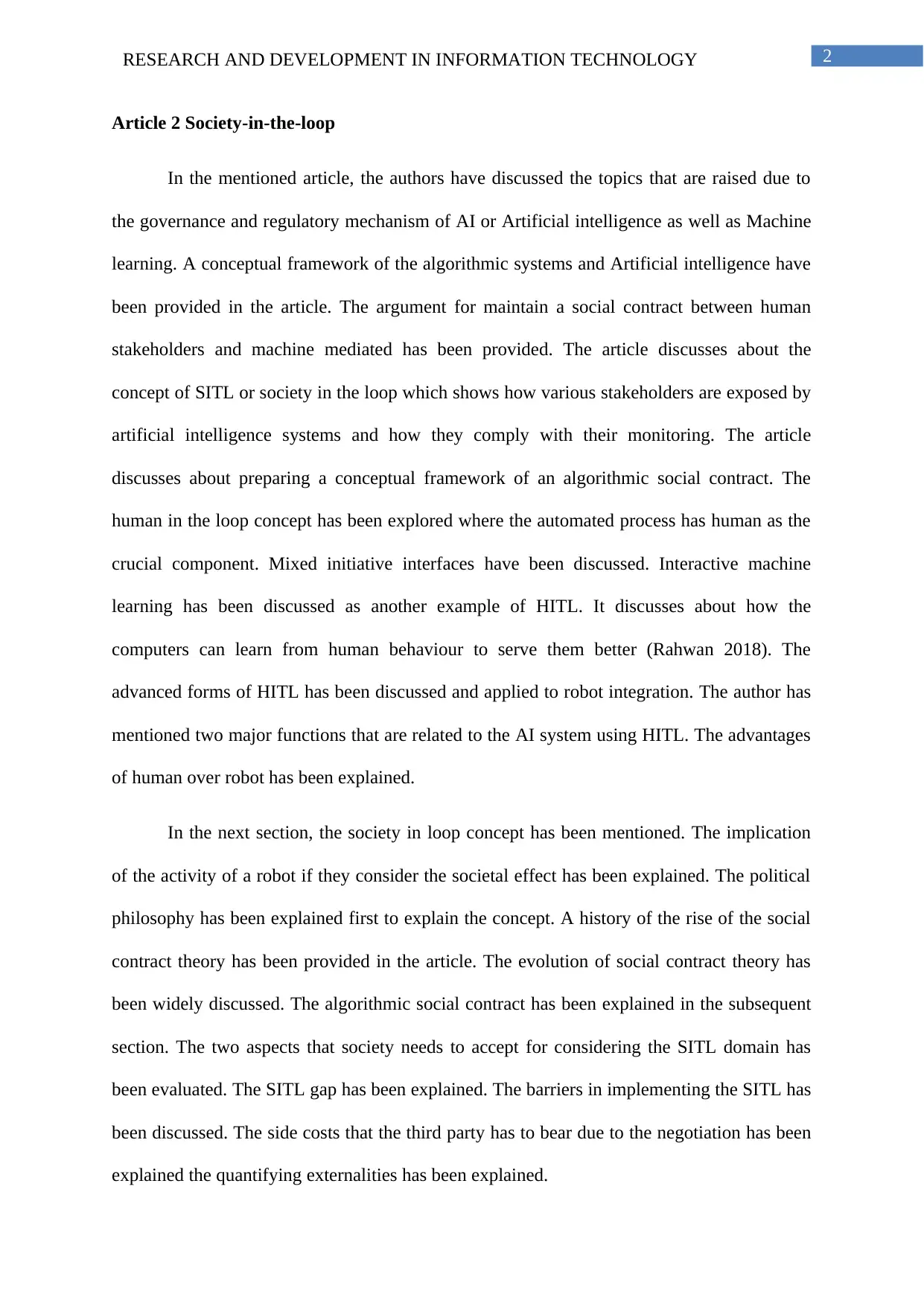
2RESEARCH AND DEVELOPMENT IN INFORMATION TECHNOLOGY
Article 2 Society-in-the-loop
In the mentioned article, the authors have discussed the topics that are raised due to
the governance and regulatory mechanism of AI or Artificial intelligence as well as Machine
learning. A conceptual framework of the algorithmic systems and Artificial intelligence have
been provided in the article. The argument for maintain a social contract between human
stakeholders and machine mediated has been provided. The article discusses about the
concept of SITL or society in the loop which shows how various stakeholders are exposed by
artificial intelligence systems and how they comply with their monitoring. The article
discusses about preparing a conceptual framework of an algorithmic social contract. The
human in the loop concept has been explored where the automated process has human as the
crucial component. Mixed initiative interfaces have been discussed. Interactive machine
learning has been discussed as another example of HITL. It discusses about how the
computers can learn from human behaviour to serve them better (Rahwan 2018). The
advanced forms of HITL has been discussed and applied to robot integration. The author has
mentioned two major functions that are related to the AI system using HITL. The advantages
of human over robot has been explained.
In the next section, the society in loop concept has been mentioned. The implication
of the activity of a robot if they consider the societal effect has been explained. The political
philosophy has been explained first to explain the concept. A history of the rise of the social
contract theory has been provided in the article. The evolution of social contract theory has
been widely discussed. The algorithmic social contract has been explained in the subsequent
section. The two aspects that society needs to accept for considering the SITL domain has
been evaluated. The SITL gap has been explained. The barriers in implementing the SITL has
been discussed. The side costs that the third party has to bear due to the negotiation has been
explained the quantifying externalities has been explained.
Article 2 Society-in-the-loop
In the mentioned article, the authors have discussed the topics that are raised due to
the governance and regulatory mechanism of AI or Artificial intelligence as well as Machine
learning. A conceptual framework of the algorithmic systems and Artificial intelligence have
been provided in the article. The argument for maintain a social contract between human
stakeholders and machine mediated has been provided. The article discusses about the
concept of SITL or society in the loop which shows how various stakeholders are exposed by
artificial intelligence systems and how they comply with their monitoring. The article
discusses about preparing a conceptual framework of an algorithmic social contract. The
human in the loop concept has been explored where the automated process has human as the
crucial component. Mixed initiative interfaces have been discussed. Interactive machine
learning has been discussed as another example of HITL. It discusses about how the
computers can learn from human behaviour to serve them better (Rahwan 2018). The
advanced forms of HITL has been discussed and applied to robot integration. The author has
mentioned two major functions that are related to the AI system using HITL. The advantages
of human over robot has been explained.
In the next section, the society in loop concept has been mentioned. The implication
of the activity of a robot if they consider the societal effect has been explained. The political
philosophy has been explained first to explain the concept. A history of the rise of the social
contract theory has been provided in the article. The evolution of social contract theory has
been widely discussed. The algorithmic social contract has been explained in the subsequent
section. The two aspects that society needs to accept for considering the SITL domain has
been evaluated. The SITL gap has been explained. The barriers in implementing the SITL has
been discussed. The side costs that the third party has to bear due to the negotiation has been
explained the quantifying externalities has been explained.
⊘ This is a preview!⊘
Do you want full access?
Subscribe today to unlock all pages.

Trusted by 1+ million students worldwide
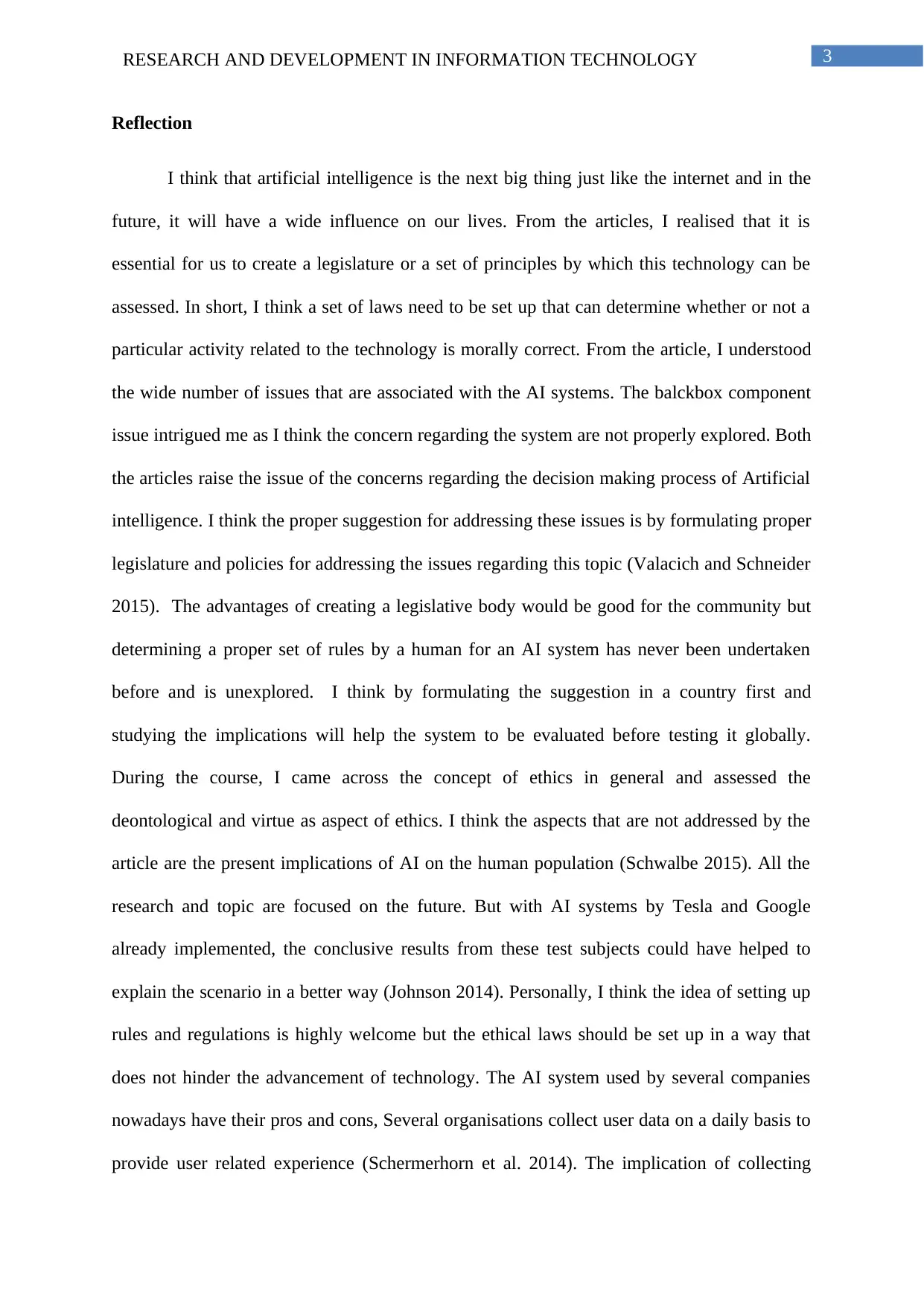
3RESEARCH AND DEVELOPMENT IN INFORMATION TECHNOLOGY
Reflection
I think that artificial intelligence is the next big thing just like the internet and in the
future, it will have a wide influence on our lives. From the articles, I realised that it is
essential for us to create a legislature or a set of principles by which this technology can be
assessed. In short, I think a set of laws need to be set up that can determine whether or not a
particular activity related to the technology is morally correct. From the article, I understood
the wide number of issues that are associated with the AI systems. The balckbox component
issue intrigued me as I think the concern regarding the system are not properly explored. Both
the articles raise the issue of the concerns regarding the decision making process of Artificial
intelligence. I think the proper suggestion for addressing these issues is by formulating proper
legislature and policies for addressing the issues regarding this topic (Valacich and Schneider
2015). The advantages of creating a legislative body would be good for the community but
determining a proper set of rules by a human for an AI system has never been undertaken
before and is unexplored. I think by formulating the suggestion in a country first and
studying the implications will help the system to be evaluated before testing it globally.
During the course, I came across the concept of ethics in general and assessed the
deontological and virtue as aspect of ethics. I think the aspects that are not addressed by the
article are the present implications of AI on the human population (Schwalbe 2015). All the
research and topic are focused on the future. But with AI systems by Tesla and Google
already implemented, the conclusive results from these test subjects could have helped to
explain the scenario in a better way (Johnson 2014). Personally, I think the idea of setting up
rules and regulations is highly welcome but the ethical laws should be set up in a way that
does not hinder the advancement of technology. The AI system used by several companies
nowadays have their pros and cons, Several organisations collect user data on a daily basis to
provide user related experience (Schermerhorn et al. 2014). The implication of collecting
Reflection
I think that artificial intelligence is the next big thing just like the internet and in the
future, it will have a wide influence on our lives. From the articles, I realised that it is
essential for us to create a legislature or a set of principles by which this technology can be
assessed. In short, I think a set of laws need to be set up that can determine whether or not a
particular activity related to the technology is morally correct. From the article, I understood
the wide number of issues that are associated with the AI systems. The balckbox component
issue intrigued me as I think the concern regarding the system are not properly explored. Both
the articles raise the issue of the concerns regarding the decision making process of Artificial
intelligence. I think the proper suggestion for addressing these issues is by formulating proper
legislature and policies for addressing the issues regarding this topic (Valacich and Schneider
2015). The advantages of creating a legislative body would be good for the community but
determining a proper set of rules by a human for an AI system has never been undertaken
before and is unexplored. I think by formulating the suggestion in a country first and
studying the implications will help the system to be evaluated before testing it globally.
During the course, I came across the concept of ethics in general and assessed the
deontological and virtue as aspect of ethics. I think the aspects that are not addressed by the
article are the present implications of AI on the human population (Schwalbe 2015). All the
research and topic are focused on the future. But with AI systems by Tesla and Google
already implemented, the conclusive results from these test subjects could have helped to
explain the scenario in a better way (Johnson 2014). Personally, I think the idea of setting up
rules and regulations is highly welcome but the ethical laws should be set up in a way that
does not hinder the advancement of technology. The AI system used by several companies
nowadays have their pros and cons, Several organisations collect user data on a daily basis to
provide user related experience (Schermerhorn et al. 2014). The implication of collecting
Paraphrase This Document
Need a fresh take? Get an instant paraphrase of this document with our AI Paraphraser
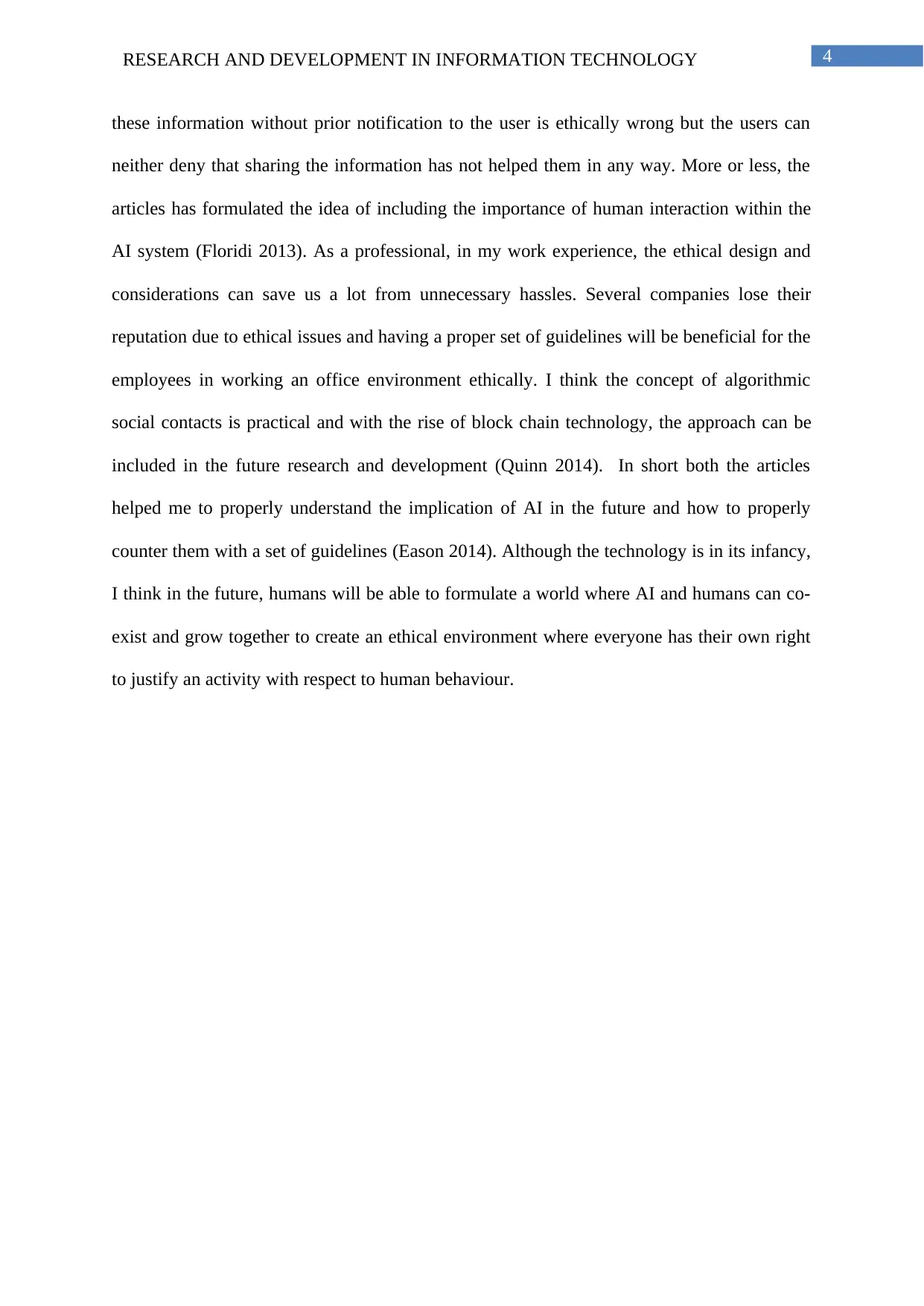
4RESEARCH AND DEVELOPMENT IN INFORMATION TECHNOLOGY
these information without prior notification to the user is ethically wrong but the users can
neither deny that sharing the information has not helped them in any way. More or less, the
articles has formulated the idea of including the importance of human interaction within the
AI system (Floridi 2013). As a professional, in my work experience, the ethical design and
considerations can save us a lot from unnecessary hassles. Several companies lose their
reputation due to ethical issues and having a proper set of guidelines will be beneficial for the
employees in working an office environment ethically. I think the concept of algorithmic
social contacts is practical and with the rise of block chain technology, the approach can be
included in the future research and development (Quinn 2014). In short both the articles
helped me to properly understand the implication of AI in the future and how to properly
counter them with a set of guidelines (Eason 2014). Although the technology is in its infancy,
I think in the future, humans will be able to formulate a world where AI and humans can co-
exist and grow together to create an ethical environment where everyone has their own right
to justify an activity with respect to human behaviour.
these information without prior notification to the user is ethically wrong but the users can
neither deny that sharing the information has not helped them in any way. More or less, the
articles has formulated the idea of including the importance of human interaction within the
AI system (Floridi 2013). As a professional, in my work experience, the ethical design and
considerations can save us a lot from unnecessary hassles. Several companies lose their
reputation due to ethical issues and having a proper set of guidelines will be beneficial for the
employees in working an office environment ethically. I think the concept of algorithmic
social contacts is practical and with the rise of block chain technology, the approach can be
included in the future research and development (Quinn 2014). In short both the articles
helped me to properly understand the implication of AI in the future and how to properly
counter them with a set of guidelines (Eason 2014). Although the technology is in its infancy,
I think in the future, humans will be able to formulate a world where AI and humans can co-
exist and grow together to create an ethical environment where everyone has their own right
to justify an activity with respect to human behaviour.
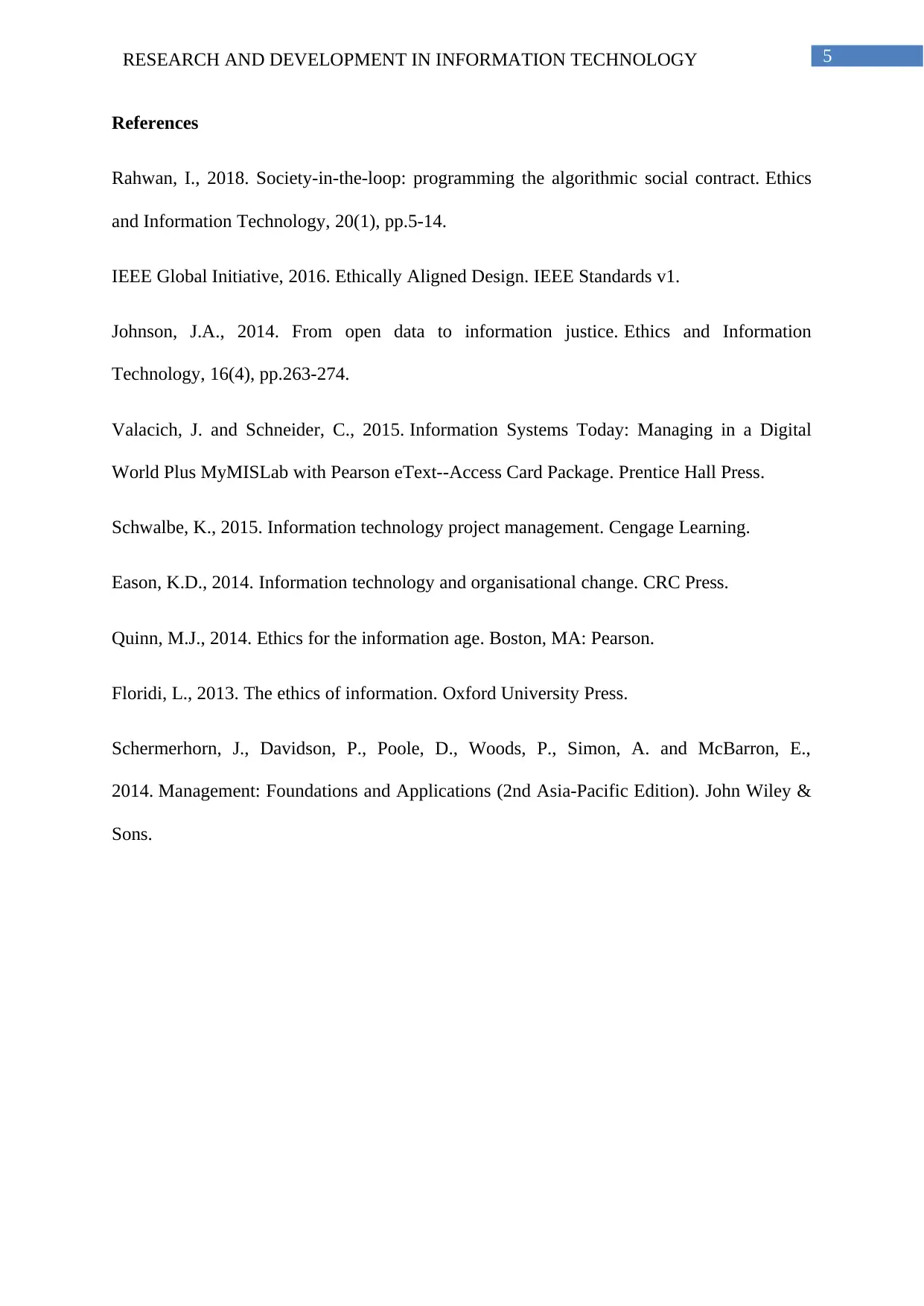
5RESEARCH AND DEVELOPMENT IN INFORMATION TECHNOLOGY
References
Rahwan, I., 2018. Society-in-the-loop: programming the algorithmic social contract. Ethics
and Information Technology, 20(1), pp.5-14.
IEEE Global Initiative, 2016. Ethically Aligned Design. IEEE Standards v1.
Johnson, J.A., 2014. From open data to information justice. Ethics and Information
Technology, 16(4), pp.263-274.
Valacich, J. and Schneider, C., 2015. Information Systems Today: Managing in a Digital
World Plus MyMISLab with Pearson eText--Access Card Package. Prentice Hall Press.
Schwalbe, K., 2015. Information technology project management. Cengage Learning.
Eason, K.D., 2014. Information technology and organisational change. CRC Press.
Quinn, M.J., 2014. Ethics for the information age. Boston, MA: Pearson.
Floridi, L., 2013. The ethics of information. Oxford University Press.
Schermerhorn, J., Davidson, P., Poole, D., Woods, P., Simon, A. and McBarron, E.,
2014. Management: Foundations and Applications (2nd Asia-Pacific Edition). John Wiley &
Sons.
References
Rahwan, I., 2018. Society-in-the-loop: programming the algorithmic social contract. Ethics
and Information Technology, 20(1), pp.5-14.
IEEE Global Initiative, 2016. Ethically Aligned Design. IEEE Standards v1.
Johnson, J.A., 2014. From open data to information justice. Ethics and Information
Technology, 16(4), pp.263-274.
Valacich, J. and Schneider, C., 2015. Information Systems Today: Managing in a Digital
World Plus MyMISLab with Pearson eText--Access Card Package. Prentice Hall Press.
Schwalbe, K., 2015. Information technology project management. Cengage Learning.
Eason, K.D., 2014. Information technology and organisational change. CRC Press.
Quinn, M.J., 2014. Ethics for the information age. Boston, MA: Pearson.
Floridi, L., 2013. The ethics of information. Oxford University Press.
Schermerhorn, J., Davidson, P., Poole, D., Woods, P., Simon, A. and McBarron, E.,
2014. Management: Foundations and Applications (2nd Asia-Pacific Edition). John Wiley &
Sons.
⊘ This is a preview!⊘
Do you want full access?
Subscribe today to unlock all pages.

Trusted by 1+ million students worldwide
1 out of 6
Related Documents
Your All-in-One AI-Powered Toolkit for Academic Success.
+13062052269
info@desklib.com
Available 24*7 on WhatsApp / Email
![[object Object]](/_next/static/media/star-bottom.7253800d.svg)
Unlock your academic potential
Copyright © 2020–2026 A2Z Services. All Rights Reserved. Developed and managed by ZUCOL.





